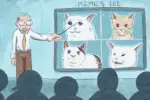Picture this: You open the TikTok app on your phone and begin to scroll absentmindedly through your “For You” page. Then, you find yourself watching a video of a 30-something-year-old man named Bentellect reading a viral social media post, usually a tweet or an Instagram picture with a somewhat funny caption, and laughing at it. You see that the TikTok garnered hundreds of thousands of likes and decide to see what all the fuss is about by clicking on his account. However, your suspicion gradually turns into confusion as you scroll through his profile and see that his content is all the same — he reads a viral social media post and laughs at it.
Social media star Bentellect — otherwise known as Ben Tarrolly — is one of the hundreds of individuals who have acquired fame through TikTok. Though he only started posting content a year ago, Bentellect has managed to gain more than 6.4 million followers on the heavily saturated platform.
As a result, people have recognized Bentellect in public. For example, Bentellect told the Wisconsin State Journal that while he was in line at a Starbucks drive-thru, a car drove past him, made a U-turn and pulled up beside him while he was ordering.
“They said, ‘Hey, I love your videos. You make me laugh every day.’ It’s usually something pretty low key, like at Target, someone will hear me talking to a cashier, or just talking to somebody,” Bentellect told the Wisconsin State Journal. “Usually that’s how people recognize me. Just because the masks make it hard to be recognized.”
Bentellect rose to TikTok fame thanks to other people’s content, which he uses without permission, payment or attribution. Additionally, Bentellect does not put in the effort to alter or even add anything to the content — instead, he merely laughs or says, “Facts!”
Consider this video, with almost 730,000 likes, in which Bentellect shared eight Twitter jokes created by other people. Incidentally, only three of those tweets received attribution and credit, while the other five ended up as cropped screenshots. Or this TikTok, with a little over 313,000 likes, in which Bentellect shared six recycled social media posts, most of which originate from Twitter. In this case, two of the posts received attribution, but users can only find one of the original creators today.
Bentellect’s TikTok profile contains links to his Instagram and YouTube accounts that provide him with the opportunity to post different, longer content. Nevertheless, Bentellect fails to seize this chance to post original, longer-form material; instead, he reposts his TikToks reacting to viral social media posts. Ironically, Bentellect’s plagiarism reaches its peak on Twitter; many of Bentellect’s tweets are stolen verbatim from other people’s accounts and include no attribution to the original authors.
I think you get the point. Bentellect’s online persona essentially hinges on other people’s work. Besides laughter, Bentellect’s only commentary in his videos consists of him yelling, “Facts!” or “What?” However, theft of online content is not a problem specific to Bentellect. For years, popular users on Instagram and Twitter have stolen viral social media posts. From hilarious memes to amusing jokes, audiences of all ages have found accounts to enjoy funny material through. Unfortunately, these platforms tolerate this practice and even incentivize it; those who leverage other people’s work, like Bentellect, end up successful and see financial gain.
The now-suspended Twitter account Common White Girl is a popular example of a parody account plagiarizing thousands of tweets. Common White Girl was an infamous account on Twitter known for its avatar from “Cinderella” and its relatable posts aimed at teenage girls. As of 2018, Twitter has suspended the account for violating its spam policy. Thus, Bentellect is far from alone in his copycatting. Critics of online personalities like Bentellect and The Fat Jewish, another public figure whose claim to fame includes using other people’s content, posit that the profit made from stealing intellectual property robs genuinely creative individuals of their deserved stardom. Virality could either result in the ordinary person obtaining 15 minutes of fame or launch a lucrative career.
While there is a necessary conversation regarding copyright infringement within the online world, Bentellect somewhat stands out compared to other offenders, mainly because he provides what he claims is additional commentary within his videos.
Although numerous social media accounts solely repost memes to entertain the masses, Bentellect does the same and adds his own comments, which could technically qualify as fair use. As previously mentioned, Bentellect takes other people’s social media posts, laughs at them and chimes in with commentary to entertain his vast audience.
Nevertheless, Bentellect could still encounter legal issues. Ruth Carter, a copyright and internet attorney, emphasized to Slate Magazine that the quality of the commentary holds weight, too. “You may not have to add much to qualify [as fair use], but I’m not sure if posting something like ‘This is funny’ would be enough to get you there,” said Carter.
As said before, most of Bentellect’s commentary consists of short, commonplace utterances instead of in-depth, distinctive statements that add to the conversation. Therefore, due to Bentellect’s situation, it is hard to determine how a social media copyright infringement case involving him would turn out. “The only way to know for certain is [someone] being willing to duke it out in court,” said Carter.
However, litigation takes a significant amount of time and money. Consequently, like Bentellect, major offenders will likely not have to concern themselves with a lawsuit, even if the creators of the stolen social media posts have a legitimate copyright claim. In addition, the law continues to lag behind technology. For example, although the Copyright Act of 1976 now includes the Digital Millennium Copyright Act of 1998, which makes it illegal to circumvent protections designed to prevent pirates from duplicating and distributing digital copyrighted works, Congress implemented it long before online reposts became a thing.
Until the law manages to catch up to technological advances, Bentellect can continue posting the same type of content for as long as he wants. Right now, Instagram and Twitter officials hold the responsibility to decide what is permissible on their platforms. Whether or not these officials will continue to crack down on accounts like Bentellect remains unknown.


















This is such an interesting topic! It’s fascinating to see how Bentellect curates and reshapes content, but it raises important questions about originality and credit. While it’s entertaining, I wonder where the line is drawn between inspiration and plagiarism. Would love to hear more thoughts on this!
Interesting perspective! I think it’s a fine line between entertainment and plagiarism. While sharing content can spark new discussions, it’s important to give credit to the original creators. It raises questions about originality in the digital age and the ethics of content repurposing.
This is a really interesting take on Bentellect’s approach! It’s fascinating how he turns existing content into entertainment, but it does raise questions about originality and credit. Where should we draw the line between inspiration and plagiarism? I’d love to hear more about the nuances of this debate!
This is such an interesting take on Bentellect’s content! It really raises the question of where we draw the line between inspiration and plagiarism. I appreciate how you highlighted the nuances in online content sharing. It’s a fine line, and I think conversations like this are really important for creators and consumers alike.
This article raises some fascinating points about the fine line between entertainment and plagiarism. While it’s true that remixing content can be a form of homage, there’s a real concern about originality and credit. I wonder how audiences perceive these reposts—do they see them as creative takes or just recycled content? Would love to hear more thoughts on this!
This discussion around Bentellect’s content really raises important questions about originality vs. entertainment. It’s a fine line between sharing and copying, and it’s crucial for creators to find that balance. Where do you all draw the line between inspiration and plagiarism?